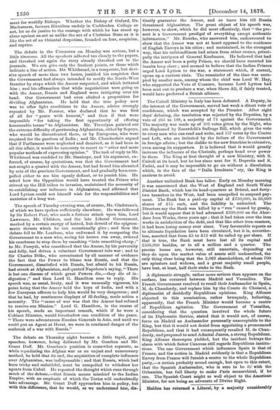The debate in the Commons on Monday was serious, but
a little tiresome. All the speakers adhered too closely to the papers, and threshed out again the story already threshed out in the journals. We can give only the freshest points, or those which indicate a line of action. Mr. Whitbread, in a temperate, but deci- sive speech of more than two hours, justified his suspicion that the Government had always intended to rectify the North-West frontier by steps which the Ameer suspected, and which irritated him ; and his affirmation that while negotiations were going on with the Ameer, Russia and England were intriguing over his head. Our Government had even elicited a proposition for dividing Afghanistan. He held that the true policy now was to offer light conditions to the Ameer, advice strongly repeated by Mr. Forster, who declared that he was first of all for "peace with honour," and then if that were impossible "for taking the first opportunity of offering honourable terms" to Afghanistan. Mr. Trevelyan pointed out the extreme difficulty of garrisoning Afghanistan, either by Sepoys, who would be discontented there, or by Europeans, who were required for the garrison of India ; and Mr. Chamberlain argued that if Parliament were neglected and deceived, as it had been in all this affair, it would be necessary to resort to "other and more popular methods of expressing opinion." The task of reply to Mr. Whitbread was confided to Mr. Stanhope, and his argument, en- forced, of course, by quotations, was that the Government had not sought a quarrel with the Ameer, but had found him alienated by acts of the previous Government, and had gradually been com- pelled either to see him openly defiant, or to punish him. He asked how the Opposition would have treated the Prince who stirred up the Hill tribes to invasion, maintained the necessity of re-establishing our influence in Afghanistan, and affirmed that Lord Lytton could not himself wish for the responsibilities and anxieties of a long war.






































 Previous page
Previous page